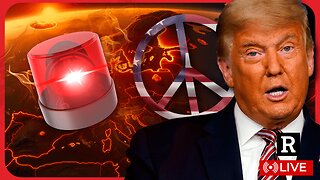Premium Only Content

Exploring the Question of Whether We Are Living in a Simulation
Exploring the Question of Whether We Are Living in a Simulation
Introduction:
The concept that we might be living in a simulated reality has intrigued philosophers, scientists, and the general public for centuries. The idea gained significant attention in recent years due to advancements in technology and our increasing understanding of computer simulations. This article aims to delve into the topic, provide a comprehensive analysis, and evaluate the plausibility of the simulation hypothesis. Additionally, we will examine the philosophical implications and potential consequences of living in a simulated world.
Understanding Simulation Theory:
Simulation theory posits that our perceived reality is, in fact, a computer-generated simulation created by a highly advanced civilization or a future version of humanity. Adherents of this theory argue that as technology continues to advance, it is plausible that we will develop simulations indistinguishable from reality, populated by conscious beings within the simulated world.
The Simulation Argument:
The simulation argument, put forth by philosopher Nick Bostrom, provides a logical framework for considering the possibility of living in a simulation. Bostrom's argument is based on three propositions: (1) It is possible for advanced civilizations to create realistic simulations; (2) If such simulations are possible, there would likely be a vast number of them; and (3) It is probable that we are living in a simulation rather than in the "base reality."
Supporting Evidence:
While the simulation hypothesis remains speculative, several intriguing observations and scientific theories provide some support for its plausibility. One such observation is the rapid advancement of computing power and virtual reality technologies, which suggests that our ability to create realistic simulations will improve over time. Additionally, the discovery of fundamental limits to physical reality, such as the Planck scale and the holographic principle, raises questions about the nature of our existence and the possibility of a simulated reality.
Philosophical Implications:
If we are indeed living in a simulation, profound philosophical questions arise. The nature of consciousness, free will, and the meaning of existence all come into play. Does our simulated reality diminish the significance of our experiences and choices? Can we trust our senses and empirical observations? These philosophical considerations challenge our fundamental understanding of reality and demand a reevaluation of our assumptions.
Scientific Investigations:
While the simulation hypothesis is difficult to test empirically, some scientists have proposed experiments and approaches to gather evidence. These range from searching for glitches or anomalies in the laws of physics, conducting large-scale simulations to observe emergent behaviors, or developing advanced AI agents within simulated environments. These investigations aim to uncover inconsistencies or limitations that could indicate the presence of a simulated reality.
Critiques and Counterarguments:
Despite the thought-provoking nature of the simulation hypothesis, it is not without its critics. Skeptics argue that the burden of proof lies with those proposing the hypothesis and that the lack of solid empirical evidence makes it highly speculative. Others contend that even if we were living in a simulation, it would have no bearing on our daily lives, as our experiences and perceptions would still be our reality.
The question of whether we are living in a simulation continues to captivate the minds of philosophers, scientists, and the general public. While the simulation hypothesis remains largely unproven, its exploration pushes the boundaries of our understanding of reality and forces us to ponder the nature of existence itself. Whether we live in a simulation or not, contemplating this question encourages us to question our assumptions, expand our knowledge, and embrace the wonder and mysteries of the universe.
#SimulationTheory #AreWeLivingInASimulation #SimulationHypothesis #PhilosophyofReality #VirtualReality #Consciousness #MeaningofExistence #ScientificInquiry #SimulationArgument #PlausibilityofSimulatedReality
-
 1:03:34
1:03:34
Donald Trump Jr.
3 hours agoZelensky Overplays His Hand, More Trump Wins, Plus Interview with Joe Bastardi | Triggered Ep.221
37.8K46 -
 LIVE
LIVE
The Jimmy Dore Show
50 minutes agoPutin Offers U.S. a BETTER DEAL on Rare Earth Metals! Flu Shots Are a Proven Scam! w/ Mikki Willis
6,851 watching -
 42:47
42:47
Kimberly Guilfoyle
4 hours agoThe Trump effect: More Major Investment, Plus America First at Home & Abroad. Live w/Ned Ryun & Brett Tolman | Ep. 201
42.8K15 -
 1:29:23
1:29:23
Redacted News
3 hours agoWW3 ALERT! Europe pushes for war against Russia as Trump pushes peace and cutting off Zelensky
69.2K159 -
 LIVE
LIVE
Dr Disrespect
7 hours ago🔴LIVE - DR DISRESPECT - PUBG - 5 CHICKEN DINNERS CHALLENGE!
2,479 watching -
 57:56
57:56
Candace Show Podcast
7 hours agoHarvey Speaks: The Project Runway Production | Ep 1
61.9K33 -
 LIVE
LIVE
LFA TV
1 day agoEurope’s Relationship With America Is Over | TRUMPET DAILY 3.3.25 7PM
113 watching -
 LIVE
LIVE
Quite Frankly
4 hours ago"European Deth Pact, Blackout Data Breach, More" ft. Jason Bermas 3/3/25
466 watching -
 LIVE
LIVE
2 MIKES LIVE
1 hour ago2 MIKES LIVE #187 Deep Dive Monday!
105 watching -
 44:25
44:25
CatfishedOnline
3 hours agoRacist Lady Shocked After Sending Money to a Nigeria Romance Scammer
3.34K2